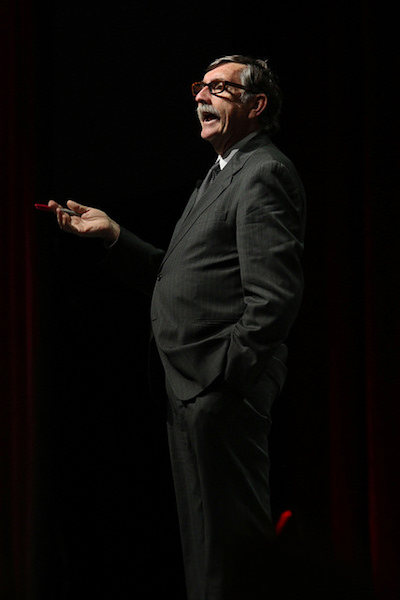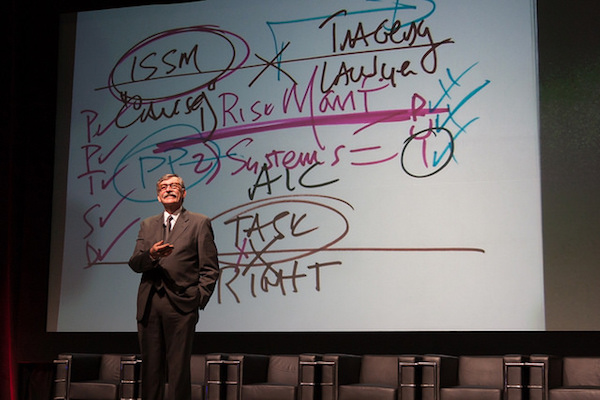
June 10, 2016 // Communicating For Safety 2016 Speaker: Gordon Graham
National Air Traffic Controllers Association
Communicating for Safety Conference
Continued Professional Training
March 22, 2016
Presenter: Gordon Graham
Air Traffic Control Operations 2016:
The Five Concurrent Themes for Success
Thanks for inviting me to Las Vegas to speak to you regarding your chosen profession, ATC, and related operations. I have possibly met some of you in prior presentations, and if that is true you know my focus in life is in the management of risk.
My goal today is to give you some ideas and strategies regarding the discipline of risk management and how it applies to you and your municipal operations. I am absolutely convinced that if more people understood the breadth and depth of real risk management we would all be a lot better off.
In 1975 I got hooked on the study of tragedies – and I have spent way too much time studying maritime tragedies, mining tragedies, refinery tragedies, train tragedies, plane tragedies, bridge tragedies, building tragedies, and power plant tragedies.
When you take a look at any tragedy in any profession and look for “What caused it?” – it is easy to spot the proximate cause. The event that instantly precedes the tragedy is relatively easy to spot. But real risk managers do not stop their search for cause with identifying the proximate cause. Real risk managers go back in time and look for problems lying in wait – that people knew about or should know about – yet these problems are oftentimes ignored until the tragedy occurs.
 Your role (and the role of everyone in every job in your organization) is to take a daily look at your sphere of influence – your span of control – and ask these questions: Do we have problems lying in wait in our fleet? Do we have problems lying in wait in our infrastructure? Do we have problems lying in wait amongst our personnel? And if you identify such an issue – that needs to be addressed.
Your role (and the role of everyone in every job in your organization) is to take a daily look at your sphere of influence – your span of control – and ask these questions: Do we have problems lying in wait in our fleet? Do we have problems lying in wait in our infrastructure? Do we have problems lying in wait amongst our personnel? And if you identify such an issue – that needs to be addressed.
If you fail to identify and address these problems lying in wait sooner or later, all the holes in the Swiss Cheese (the thoughts of Dr. James Reason) are going to become aligned – and when that happens the tragedy occurs – and then the lawyers take over and the problems lying in wait are then identified and addressed – after the fact.
I gave you a number of examples from a variety of professions earlier today, but my focus today is in your operations in the U.S., which today face an unprecedented level of risk.
So what can we do? Allow me to introduce you to The Five Concurrent Themes for Success. I have put together this platform for success (a checklist) that may assist you in better improving your operations. This platform consists of five separate and distinct issues (themes) that when put together will allow you to analyze any of the tasks we do to better assure things get done right.
Here are my Five Concurrent Themes for Success:
Risk management is the cornerstone of these Five Concurrent Themes. With this in mind, we need to learn about the word risk. Risk is part of life. You took risks coming to this class today, even if it was just a short drive or an elevator ride. You will take a risk eating dinner tonight and traveling home at the end of this program.
There is not one of you in here today who has not heard the phrase, “risk management.” Unfortunately, the phrase is grossly misused, many times by people who have no clue what they are talking about. Let me assure you, the discipline of risk management is extraordinarily valuable to all of you in your high-risk profession.
Every identifiable risk is a manageable risk. Properly managing risks prevents problems. Over the years, I have spoken extensively on the management of risk, and what your role is with respect to risk. This is where I would like to start our discussion.
Historically, most government operations do not take risk management seriously. Check any federal, state, or local government phone directory. You will find a lot of government lawyers, but few, if any, dedicated government risk managers.
This is an important point, which will be further addressed in this and the next paragraph. Next time you see a government agency in the news negatively any place in the U.S., give them a phone call. Find out how many personnel they have dedicated to internal affairs (post-incident) investigations, and how many are dedicated to background (pre-incident) investigations.
We would be better served by excluding bad people from our profession up front, rather than firing them after they participate in some nefarious behavior. Contrary to the view of some of the loudmouths in the world, you are not some evil cauldron that takes good people and turns them into bad people. In the news recently were some stories about sports coaches molesting young kids. These predators were bad people long before they were hired and became involved with the team.
Along the same lines, your organization – for a number of poorly thought out reasons – occasionally hires bad people who continue to be bad people. Successful private sector companies take risk management more seriously than we do in government. Why?
Time out for a paid political statement: America is a nation of laws. We have heard that statement a lot since the terrorist murders of 9-11. It is very important that we remember this thought, as it is critical to the survival of our country. We are a nation of laws.
Unfortunately, we have also become a nation of lawyers. I do not say his as lawyer bashing. I do not bash lawyers. Lawyers are fine people with good hearts and intentions, but with an extremely limited scope of thinking. They work in a different paradigm.
Their entire lives are focused on fixing things after they go bad. That is what they study in law school (case law) and that is what they do in their practices (clients with existing problems).
Again, they are good people, but with a limited scope of vision. Many of our fine elected officials at all levels of government are lawyers. They bring this thinking of post-incident correction with them into government work.
Risk managers do not think this way. Their whole lives are focused on pre-incident prevention of problems. I don’t know one educated and trained risk manager in America who holds elected office. Not one!
This is not something that all of a sudden became important to me on September 11, 2001. This has been my focus over the last four decades. What will it take to wake people up? Prevention is better than correction. Small, smart expenditures of effort and money up front can prevent massive downstream problems. You can make this happen individually and organizationally.

Let’s take time for a definition – and if you have been to any of my programs, you have seen this definition before. Webster takes a stab at defining “risk” as “the possibility of meeting danger or suffering a harm or loss,” or “exposure to harm or loss.” As a follow:
Risk management is any activity that involves the evaluation of, or comparison of, risks and the development, selection and implementation of control measures that change outcomes.
Or, more simply stated, risk management is the process of looking into the future (short or long term) and asking what can go wrong and then doing something about it to prevent it from going wrong. In RM 101, you are taught the concept of RPM: Recognition, Prioritization, Mobilization.
First, you must recognize the risks you and your people face in your particular organization. Next, you must prioritize them in terms of potential frequency, severity, and available time to think prior to acting. Finally, you have to mobilize
(act) to do something about the recognized and prioritized risks. This mobilization is the system’s component – the second of my five concurrent themes for success.
Systems. The word gets thrown around a lot but what does it mean? According to Webster: “an organized or established procedure” or “an accumulation of processes.” When you check under “process” and “procedure,” you will find a particular way of accomplishing something, and also a series of steps followed in a regular definite order. And please recall that before I was in law school, I attended the USC Institute for Safety and Systems Management. I am a huge fan of systems and process.
Whenever I see a tragedy in your operations (or outside of your profession for that matter) I always do the Systems DUI Analysis. Was there a properly designed system in place? Was it up to date? Was it being implemented? It gets down to design, update, and implementation.
Please do not subscribe to the thinking that there is nothing that can be done to prevent tragedies. I am sick of that attitude! While you have a very risky profession, you are not in the most risky profession. Timber operations, commercial fishing, aviation, structural metal workers, and long haul drivers all have higher adjusted loss rates than you do.
But take a look at some of the leaders in those occupations, and see what they are doing. Timber operations are risky, but Boise-Cascade is underrepresented in problems. Trucking is dangerous, but UPS has a great safety record in their long haul operations. Chemical plant operations are dangerous, but Dupont is a vanguard in their industry.
Well-designed systems, kept up to date and fully implemented will never let you down. This is also true in your profession. First, your agency has to build good systems (policies) and keep these policies up to date. This is the responsibility of the executive team in your agency. Next, your supervision and management team has to assure that all department personnel are doing what they are getting paid to do (i.e., following the policies of your organization).
Why is this so important? If you take the time to study the nasty consequences we get involved in, so many of them get down to systems not being implemented. There are three principle reasons that systems are not followed. They are:
- Arrogance: The rules do not apply to me.
- Ignorance: I have no idea what the rules are.
- Complacency: I have done it this way for a long time and will continue to do so.
This is a major concern of mine for your profession. But for right now, let me ask you this question: Does Bud (or Budette) work in your organization? Let me identify Bud for you. Or should I change his name to Francesco?
Our third theme is Customer Service. This is such a critical issue today, and frankly many employees do not quite understand the ramifications of not taking this seriously. This is not my focus today, but for our limited purposes in this program, here is a three-point guide to creating loyal customers:
- Get things done right the first time.
- Treat people right all the time.
- Add in the WOW factor whenever possible.
 Our fourth theme is Accountability and the increasing lack of it in society and our profession. This is a dying concept in so many organizations, with craziness abounding. Statements like “… that is not my job…” and “she doesn’t work for me…” and “…we have never done it that way before…” are getting a bit tired and quite frankly customers are getting fed up with employees who are unable or unwilling to accept the fact that they need to be accountable.
Our fourth theme is Accountability and the increasing lack of it in society and our profession. This is a dying concept in so many organizations, with craziness abounding. Statements like “… that is not my job…” and “she doesn’t work for me…” and “…we have never done it that way before…” are getting a bit tired and quite frankly customers are getting fed up with employees who are unable or unwilling to accept the fact that they need to be accountable.
Executive accountability starts with having good systems (policies and procedures) in place.
Executive accountability continues with promoting good women and men into supervisory positions who have the guts to enforce the policies of the organization, and then to support these supervisors when they make the tough calls.
Executive accountability continues with having a discipline system in place to address those in the organizations who are convinced that rules do not apply to them.
Finally, executive accountability includes a robust audit system (both formal and informal) in place to assure what you say you are doing is in fact being done.
Your supervision and management team has to assure that all personnel are doing what they are getting paid to do, (i.e., following the policies of their organization). This is what supervisor accountability is all about – enforcing the policies that were developed by the executive team.
With respect to line personnel, their accountability is to know and follow the policies and procedures of the organization and following these systems. I don’t care what policy it is – we have to get our personnel following the policies of the organization.
Everyone in the organization, up, down and around the chain of command, has accountability. There are different levels of accountability, but each of us is accountable to do our jobs correctly. When accountability is not present, you have mediocrity. Mediocrity is at the top of a slippery slope that ends up in a loss of integrity.
Here is a quotation I have been using now for over 15 years. In the ’90s, LAPD got in a ton of trouble with the Rampart Scandal. After the fact, a number of experts (mostly lawyers) analyzed what caused this tragedy. While the lawyers focused on proximate cause – one fellow identified the problem lying in wait.
This nugget of gold was written by Commander Ross Swope of the D.C. Police Department, and I recognize that you are not in law enforcement operations. But everyone in every high-risk organization needs to understand these words and what they mean to your operations.
“The major cause in the lack of integrity in American police officers is mediocrity.”
The following passage is taken verbatim from the LAPD report, published March 2000:
Captain Swope went on to explain that mediocrity stems from the failure to hold officers responsible and accountable. It comes from a lack of commitment, laziness, excessive tolerance, and the use of kid gloves. He felt that dealing with mediocrity is perhaps the greatest contemporary challenge to American law enforcement. When asked to explain how mediocrity is dangerous, Captain Swope drew an analogy of the bell curve. At the high end of the bell curve are those officers who practice all the core values: prudence, truth, courage, justice, honesty, and responsibility. At the other end are the officers with few of those values. In the large middle are those officers who have some or most of the core values. The extent of moral influence in a police department depends on the extent to which the upper and lower portions influence those in the middle. The men and women who control that influence are sergeants, lieutenants, and captains. The irony is that everyone within a work place knows full well which of the three categories their co-workers fall into. When officers in the middle see that officers at the bottom end are not dealt with, they sometimes begin to imitate their behavior. Similarly, when those at the top end are recognized and rewarded, they become the workplace standard. The principal, though not exclusive, agents in encouraging top end or bottom end behaviors are supervisors and middle managers. It is our sergeants, lieutenants, and captains who have the daily and ongoing responsibility to ensure that appropriate workplace standards are maintained. However, that observation in no way relieves upper managers from their responsibility to ensure that proper standards are being maintained in their subordinate commands by providing appropriate guidance, exerting their oversight responsibility, and honestly evaluating the effectiveness of the commands for which they are ultimately responsible.
Integrity is the fifth of these Five Concurrent Themes. Lose integrity and you will not be able to achieve the manifestation of integrity known as ethical behavior. Lose your ethical behavior, and you have lost the public trust. Without the public trust, we have nothing. Where did this slippery slope start? Mediocrity is a cancer that can spread quickly in an organization, and if not eliminated, it will destroy your operations.
I have this odd belief that our citizens have the right to expect that all of your personnel possess this integrity, and not just at point of hire, but throughout their employment career – and I am a huge fan of ongoing background investigations. And not to be Mr. Negative here, but how much damage could one bad employee in your department do?
So, why have I wasted some time out of your life with this? Your chosen profession is extremely complex and filled with risk. I am not kissing up to you and I do not say this when I talk to a group of real estate people, or lawyers or bankers. Air traffic operations are complex in nature, and are getting more complex.
What I am trying to do here is to give you a checklist approach (and I love checklist and am begging you to read Checklist Manifesto by Dr. Atul Gawande and it has direct applicability to what you do) to getting things done right. Whatever the task is that you are doing or planning on doing, please start to analyze (if you have time) the task along these lines:
- What is the risk involved in this task, and how can I best manage that risk?
- What is your organization’s system (policy) and how can I best assure its implementation?
- Is there a customer service component here and, if so, how can I maximize customer service on this task?
- Who is accountable for what on this specific task?
- What are the issues of integrity involved in this specific task?
If you try this for just a week, you will get it down to a couple of seconds per task. And if you use it regularly, you will have a higher probability of getting things done right and staying out of trouble.
And the anchor for these Five Concurrent Themes, and my focus for our brief time together, is the wonderful discipline of risk management.

Here are three statements that have guided me through most of my adult life. First is a quotation, albeit paraphrased, from the great risk management guru of the ’40s, Dr. Archand Zeller:
“The human does not change. During the period of recorded history, there is little evidence to indicate that man has changed in any major respect. Because the man does not change, the kinds of errors he commits remain constant. The errors that he will make can be predicted from the errors he has made.”
What does this mean? We have not figured out any new ways to screw things up. We are making the same mistakes over and over again. Refineries have not figured out any new ways to blow up. Cops and firefighters have not figured out new ways to get in trouble. Restaurants have not figured out any new ways to poison people.
Airplanes have not figured out any new ways to be involved in accidents. This was demonstrated by Cal Rodgers in 1911 in the very first cross-country flight in the U.S. on the Vin Fiz! If you Google that, you will read a fascinating story.
Employees in any given organization have not figured out any new ways to get in trouble. To be sure, there are variations on a theme, but in reality, it is the same stuff over and over again.
The second statement important in my life thus far came from my mentor, professor, and friend Chaytor Mason. He was a risk management guru in the ’70s. Here is a capsulized version of his response when I accused him of being the smartest person who ever lived:
“The smartest person in the world is the woman or man who finds the fifteenth way to hold two pieces of paper together.”
My instant response when I first heard this was confusion, but then I figured it out. While there are no new ways to screw things up (Zeller), there are always new ways to fine tune and revisit our existing systems to prevent bad things from happening.
Status quo (we have always done it that way, we have never done it that way) no longer works. Unfortunately, I see a lot of this in many operations. There is always a better way of doing business, the 15th way, and we must constantly be looking for it. And, the third thought…
“Things that go wrong in life are predictable, and predictable is preventable.”
Thanks for your patience. I have been using this line since 1980 and I appreciate your indulgence. Want proof? Take a look at your newspaper today. Hopefully, I will have a copy of the local paper with me today, and we can read some of the top stories from around America and I will prove to you that:
Predictable is Preventable
Anyhow, it was an honor to address you this afternoon. If you ever need anything please let me know.
Gordon Graham
www.Lexipol.com
[email protected]
or my personal office:
714.374.9326

